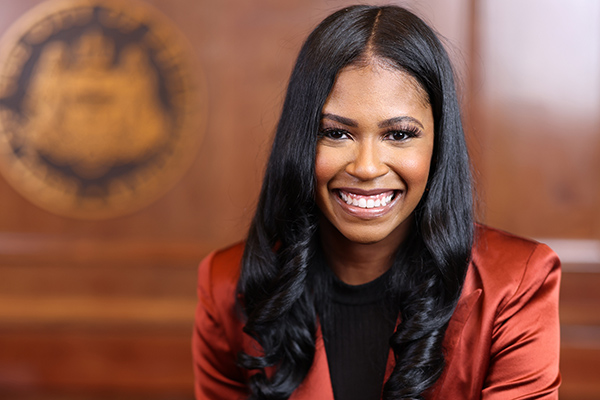Working at the Intersection of Race and the Environment
Brielle Brown, Class of 2022

Brielle Brown, JD ’22, hopes to advocate for marginalized communities in one area that is easily overlooked: the environment. Brown currently serves as an associate with the environmental and energy law practice of Manko, Gold, Katcher & Fox in Philadelphia, where she researches and drafts legal memorandums in matters of emissions compliance per federal regulation for clients.
The concept of environmental racism asserts that Black, Indigenous and Hispanic communities disproportionately suffer from pollution and decaying infrastructure, resulting in higher rates of illness and other negative health outcomes. Often, people experience adverse long-term health effects from harmful chemicals and polluted air and water decades after exposure, making legal remedies difficult.
“It’s hard to find a cause of action, because people are recognizing these health issues way down the line, after the statute of limitations has passed,” Brown said. “It’s very, very difficult to work through these nuanced issues, like dumpsites being four times more likely to be placed among Black and Latino communities.”
Brown interned at Manko, Gold, Katcher & Fox in both 2020 and 2021, before joining full-time in September 2022. As an intern she researched and wrote legal memos for the firm, extensively mining background information on underlying tort issues that surround environmental justice and compliance.
“Flint, Michigan is a great example of how waste pollutants can drain into the wrong places if their permits go unchecked under state and federal clean streams law,” Brown said.
Brown worked on a significant pipeline drainage lawsuit in Philadelphia. The case involved the jurisdiction of the Federal Clean Streams Law, which regulates the discharge of pollutants and sewage, to prevent them from seeping into waterways.
“Flint, Michigan is a great example of how waste pollutants can drain into the wrong places if their permits go unchecked under state and federal clean streams law,” Brown said.
Brown even wrote a 10-page memo for the pipeline drainage case. Her colleagues referenced her memo during the trial, and the case was ultimately settled in the firm’s favor.
Environmental compliance is important in legal cases, Brown said, because a lot of litigation hinges on an interpretation of a statute or a regulation.
Moving ahead, Brown expects to work closely with clients so that they comply with the New Jersey Environmental Justice Law that passed in 2020. Although the law is not yet operational, Brown said the sweeping new legislation could change the landscape of compliance requirements for facilities with hazardous air emissions. New Jersey could have the strongest environmental justice rules for obtaining permits in the future. This could lead to similar legislation in Pennsylvania.
“Compliance lawyers sort of serve as the first barrier of protection,” Brown said. “They can help a business recognize the issue, and ensure the company implements policy to meet the requirements.”
Drexel Kline Law’s Stern Community Lawyering Clinic, where law students advocate on behalf of clients under the supervision of a licensed attorney, allowed Brown to focus on another aspect of racial justice and to make an impact while a student.
“You have to be the lawyer,” Brown said, reflecting on her year-long clinical experience.
As a 3L Brown worked to have the life sentence of a client who turned his life around in prison commuted. Life sentences disproportionately punish Black men, she said.
Brown learned a lot about Pennsylvania’s criminal justice system during the process and crafted a persuasive narrative to argue why the elderly man should be released. Legal counsel are not permitted to speak for their clients during commutation hearings, so Brown prepped her client with talking points so he could respond confidently when answering questions during the hearing.
“The clinic literally changed my life in the best way possible,” Brown said.
Now released, Brown’s former client serves as a community interventionist in Philadelphia, working to prevent at-risk youth from falling into the same trap of gang violence that led him to incarceration.
LEX Magazine: ‘Race, Law and Infrastructure’
Brown was interviewed for the story “At the Crossroads of Justice: Race, Law and Infrastructure” by Wendy Gibbons, published in the fifth issue of LEX, The Magazine of Thomas R. Kline School of Law. Read the article.
Drexel Law Review
Brown, who was on the Drexel Law Review executive board, wrote a note titled “Where’s my Ballot?: Why Congress Should Amend House Bill H.R.1 to Include a National Mandate of Drop Boxes for Federal Elections to Help Protect the Black Vote,” which can be read online.
‘Redeeming Justice’
Rachel López, associate professor of law, directs the Stern Community Lawyering Clinic. López co-authored the article “Redeeming Justice” along with Kempis “Ghani” Songster and Terrell Carter, who were previously sentenced to life without parole but later released. The authors argue that life without parole sentences violate the Eighth Amendment, which forbids cruel and unusual punishment. Therefore, the right to have one’s prison sentences reviewed for commutation upon proof of rehabilitation should be considered a constitutional protection. Read more about the collaboration.
Philadelphia Diversity Law Group
The law school’s Career Strategies Office introduced Brown to the Philadelphia Diversity Law Group, which is composed of law firms committed to diversity, equity and inclusion, and matches law students like Brown with firms who are suited for their career interests. Learn more at www.pdlg.net.